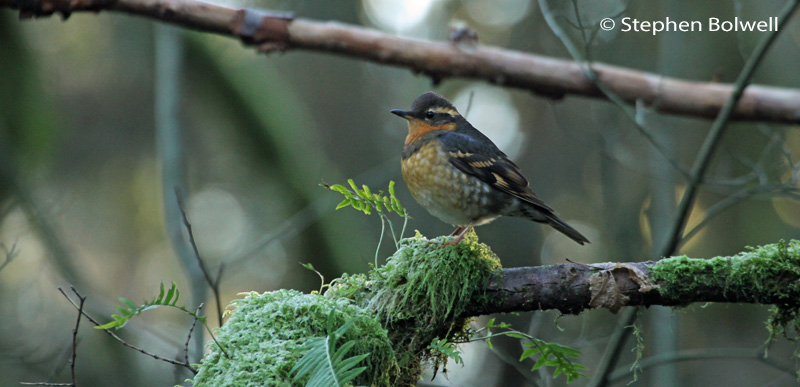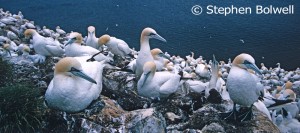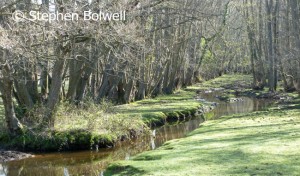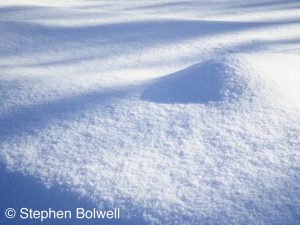In Search of the Varied Thrush.
The varied thrush is not a rare bird where I live on the Lower Mainland. B.C.. Usually it overwinters in lowland forest and scrubland, but with ever increasing urbanisation many of its natural habitats are disappearing. Worldwide, woodland birds are under pressure as our numbers continue to rise and many natural areas are given over to agriculture, industry and housing.
Once, when a student, I went for a jog in Central London. Setting out from my hall of residence in South Kensington at 5.00 p.m. on a Friday afternoon I ran diagonally across Hyde Park to Marble Arch and back. It took a while, and on returning I lay on my bed for several hours wondering if I might be dying… I was 21 and my condition wasn’t down to over exertion, it was carbon monoxide poising, along with an unhealthy cocktail of other exhaust pollutants which then included lead. In those days, running in a town or city was a death wish… and probably, it still is.
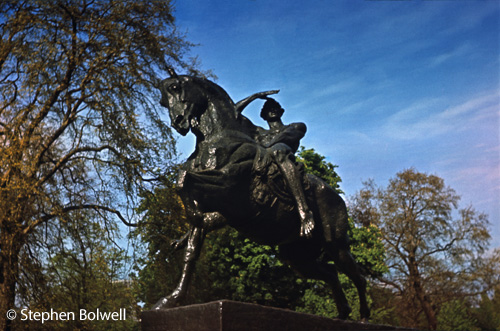
I remember a time when only sporty people in training went for a jog. Ask my father when he last voluntarily ran and he’d look at you as if you were crazy. Working a sedentary office job for most of his life he didn’t even do walking for exercise, unless there was a ’99’ at the end of it – that, if I remember correctly is a cone of soft ice-cream with a chocolate flake shoved into it.
My father is now 93, has always been active, but has never ‘run for fun’, and remains in reasonable health for his age. Without the hook of an exercise induced endorphin rush, he’s managed to hang onto his own hips and knees, which is more than can be said for a great many of old joggers.
And that’s what I’m seeing today – lots of joggers of all ages, shapes and sizes as I walk through the urban reserve in search of varied thrushes, for no better reason than they are beautiful. I’d prefer to do this in wilderness, but that’s a good hour away. I live in suburbia now, and visiting a local reserve is altogether more practical. Nevertheless, this will be my worst day photographing wildlife for a very long time – it appears a group of people have met up in the car park to organize a major surrealist experience for me… but I don’t know that yet.
I watch a woman jog by; she’s wearing the sort of clothes that others sport if they want to look smart when out shopping, except few will wheeze like she does even walking through a mall let alone running. Well, I say running… if I left the camera I could walk three times faster, and possibly backwards. Like the frog that halves it’s distance with every jump across the path, logic suggests that given infinite time, this woman will never make it back to the car park.
I’m not complaining you understand, this is after all a public place – so what can you expect…More importantly, what might you hope for – fewer dogs perhaps. I think back to my childhood, to a time when dogs jumped over garden gates to exercise themselves, usually inappropriately, as without supervision they invariably get into mischief. It is of course much better now that they are on leashes and accompanied by responsible owners. But when did this mass dog walking thing start? I’ve never seen so many. It’s two in the afternoon and suddenly finals day at Crufts.
Usually I wouldn’t mind, but after a long search I’ve found a small group of varied thrushes coming down from the trees to feed; they are on the opposite side of the path working around the base of a stump and sometimes feeding on top of it. I’m trying to get a few shots, but with the constant procession of people and pets, my chances have been fleeting.
There is for a moment a lull and it looks as if I might get something, then suddenly a coyote dashes though in the back of frame. Perhaps it’s the big one I saw this morning crossing a wetland on the boardwalk, the one that eyed me with complete indifference. But this ‘Wile E.’ is the wrong colour, and I soon recognize it as a big brown dog crashing through the undergrowth with considerable force. There is a flurry of activity as two squirrels dash past, and the back ends of three thrushes rapidly diminish in size as they missile away. Seconds later, the dog flashes past me as well, and he’s having the time of his life. Then his owner comes into view around a curve in the path.
‘Is that your dog? I ask, sounding indignant, which I do really well.
‘Yea it is, and he just loves those squirrels!’
I’m guessing he means in the same way that I love a prawn curry. As quickly as the dog and his man arrived they disappear and after a few minutes things settle down again – just like one of those few happy scenes in ‘Bambi’, the animals return to the space in front of where I am sitting.
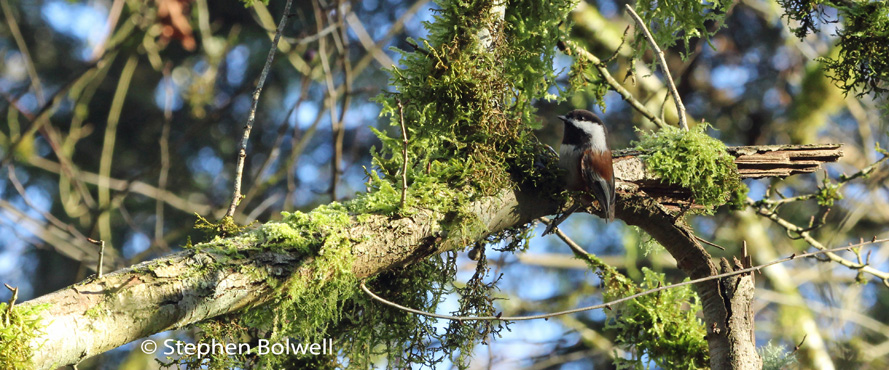
Just as I’m thinking that all is not lost… I realise I am mistaken… Another dog, this time a grey one, comes dashing around the corner and it looks like a pointer – the sort of dog that has most of its brain connected to its nose with not a lot left over for everything else; he’s moving at speed and co-ordination appears to be a problem; there’s never a time when this creature doesn’t look as if he is going to crash into something. Miraculously, the dog stays on its feet as he passes me, and fortunately there are no small children around to take out. Then, as quickly as his arrival, the creature has gone and the madness over… But no… he’s back and passing me again, this time in the opposite direction, and at breakneck speed only just re-takes the corner.
Thank goodness, it’s finally over… But hang on, it’s not… Like a bad case of deja vu, this doggy nightmare has returned to do it all over again, but now with a seven foot chunk of tree in his mouth. The strength of this animal’s neck is incredible – the branch is held at one end, with the rest barely touching the ground – and he’s still coming – which is troublesome.
The path is about five feet wide and if Muttley stays on course, both the tripod and camera will be toast. I can either grab the tripod or my camera bag… I opt for the tripod because most my money is on top of that. At the very last moment, as I prepare to jump into the undergrowth, the dog veers across to my left and into the woodland, sything everything in his path. It has been freezing cold for days, and up until now, the ferns have managed to withstand the onslaught of permanent frost, but they are no match for this new threat. Fern fronds and frost flakes flash and fall in the sharp light of a sun now dropping ever lower into the trees.
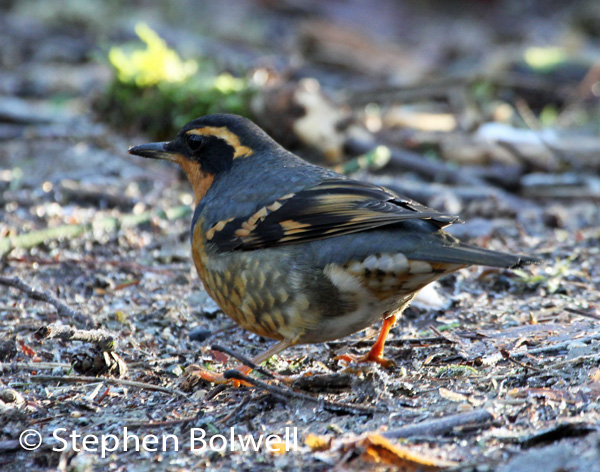
Not long after, as things quieten down again, a young woman rounds the bend.
‘Is that your dog?’… my words of indignation are now well practiced.
‘Yes, he’s mine’, she says with pride.
‘He should be on a lead. This is a conservation area.’
Is it? I didn’t know that.’
Shortly after, as she passes by, the young woman becomes embroiled in conversation with an older lady who is walking a dog in the opposite direction – the pointer is long gone, and the older lady offers friendly advice.
‘It is as well to have your dog on a leash’ here. she suggests, ‘The wardens were around yesterday and they take a dim view of dogs away from their owners.’
‘Missed it by a day’, I’m thinking. The irritation hasn’t subsided yet, and feel obliged to say,
‘I don’t mind your dog off of the lead so much as it being totally out of control’.
There’s no response to this, which at the very least, saves a lot of time.
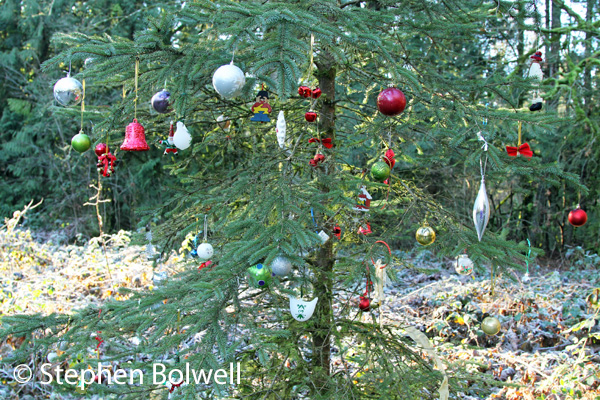
Earlier in the day I heard somebody ask a dog walker to put his dog on a lead because there were young children about. The request was accompanied by a please and the dog owner immediately complied. Not the sort of response I would get when living in Britain, where asking a dog owner to leash their dog was frequently greeted with a hostility more in keeping with an assault on their mother.
But this is Canada and most Canadians are relentlessly reasonable – in fact, they can wear you down with their reasonableness – but you can’t help but like them, although often, when out in the nature some will speak very loudly and you hear them coming a mile away, but I’m guessing that’s to scare the bears away, because it scares away just about everything else. When the voicesters eventually pass, invariably they apologise, presumably for being alive and too close to you, even though they have every right to be. I always feel bad about this, because nobody should be expected to have to deal with such nice people.
I really am running out of light now – as the sun drops things get increasingly cooler. I’ve been out all day, and can no longer touch the camera without shaking it. There’s still a little time though, so I take the obvious course and attach a flexible cable release.
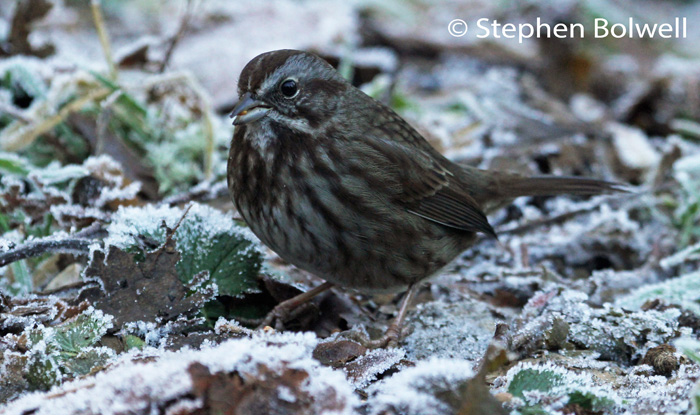
The thing is, the joggers, the dog walkers and me… we will all get to go home for our evening meal. But right now, the birds are on the brink of roosting and if they haven’t fuelled up adequately during the day, some will not see tomorrow’s sunrise. When you live in a centrally heated condo and have totally lost contact with the outside world, understanding the most obvious things about nature is a big ask. We simply lose awareness. It all looks so beautiful; the birds are all in fantastic condition, and that’s because, those that aren’t… are already dead.
I begin to feel as if this is my last chance with the thrushes. It seems odd that I should feel this so repeatedly. A nun goes by and she smiles as she says hello, and I’m thinking – now I’m in a ‘Monty Python’ sketch, but this is no man dressed up as a woman, she’s authentically normal and quietly reading something. I really want to know what it is, and strain my neck to see. I’m guessing it is a religious text, but hoping that it might be ‘Catcher in the Rye’. an altogether more appropriate read for this particular afternoon. Sadly, I will never know.
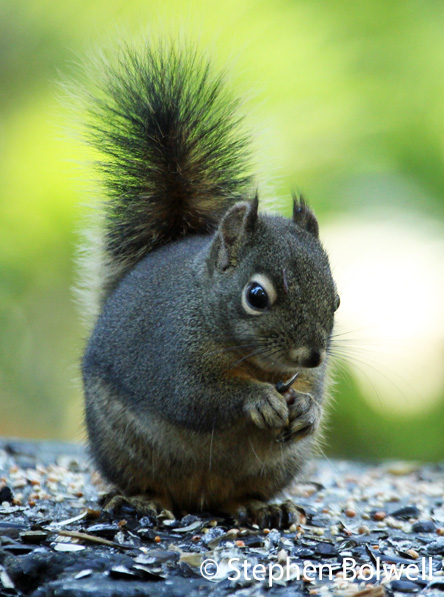
Then the reason I am here shows up. Or rather the husband of the reason I am here shows up; soon to be followed by the reason I am here. Just as I’m getting a good shot of the thrushes, a voice behind me says. It’s a tui isn’t it? because whatever I am doing appears totally inconsequential to the voice owner.
‘No!’ I say, but nothing follows, because I’m thinking that a tui is a bird that isn’t even on this continent. Much later I realise that he must be saying ‘Towee’, but not before my wife has worked this out and explained it to me.
Then his wife and I say in unison: ‘It’s a thrush’.
Which is quite something, because as yet I still haven’t seen her.
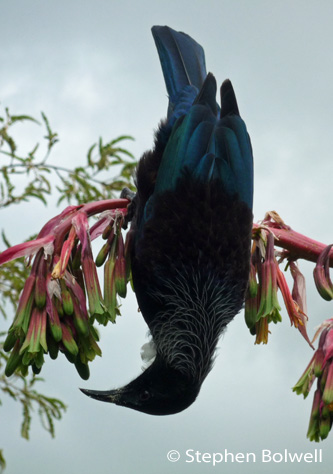
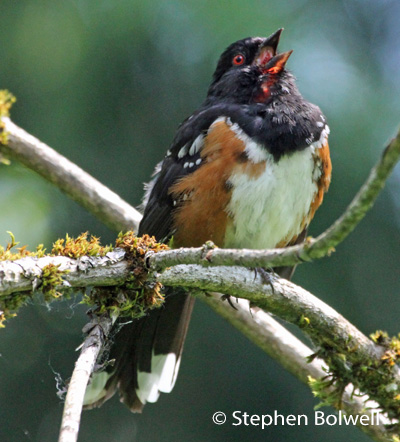
A tall man of some age moves past me and what is most striking about him is that attached to his front is a harness and pulling at the harness is a dog. In this ‘Alice in Wonderland’ world I am now living in I begin to wonder if this is the way that old people get around now. I’ve seen plenty of people dragged along by their dogs, but this is the most novel method of increasing mobility for the aged I’ve come across and wonder if it will catch on. I hope so, because presently the old gentleman is standing right in front of the camera.
Then his wife passes by and moves ahead of him, scattering peanuts and seed to either side of the track as she goes, which immediately reminds me of ‘The Sower’ – a picture by Jean Everett Millais. An artist who was born in the same place as I was – Southampton, England. Although at the time of writing I’m around 124 years younger than he is, which doesn’t seem unusual on a day when anything seems possible.
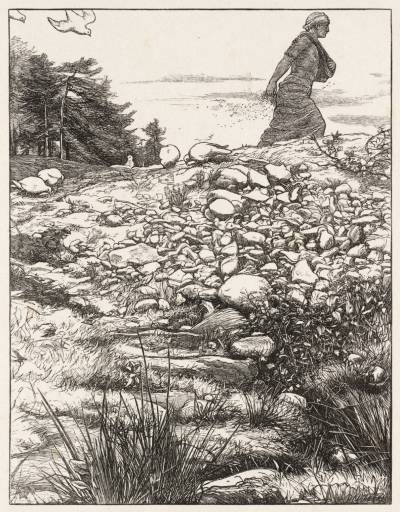
Once the couple have gone, the birds return and begin to feed more unpredictably in all of the places the woman has cast her nuts and seeds. I have been picking off shots through the afternoon as birds and squirrels come and go, essentially because they are finishing up the remains of her previous food drop, but now she has provided too many options for me to cover.
Feeding wild animals can be a problem. Knock up the grey squirrel population and they’ll be eating young birds in the nest come spring. It’s difficult to know what best to do. For much of the year feeding is unnecessary anyway, but without doubt, this activity gets more birds through the winter, especially in this very cold weather with all the human disturbance they have to endure, and with so little natural habitat left in the surrounding area. Present regulations no longer provide a completely sustainable environments for wildlife in suburban areas and how we conserve what remains is open to question. With well meaning people out feeding local ferrel cats, it is apparent that bird conservation is not top of the list for everybody. Some just have other priorities.
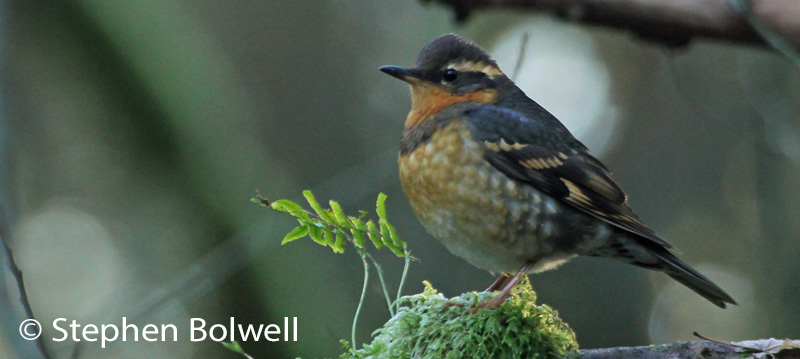
There are now birds and squirrels all around me picking off the food that has been scattered – a last chance to feed before nightfall. With only a few minutes before the light goes altogether I set to my task with renewed enthusiasm – I just want to get a little more, but a group arrives and stands right in front of me as if they haven’t noticed my existence, even though I’m crouched almost at their feet. They have chosen to have a meeting, which they are perfectly entitled to do, but it’s a dog poo moment for me. Clearly this isn’t my afternoon.
‘Sorry,’ a girl has already said as she passed me on the path, at just about the same time as a lady from the approaching group of five recognised her. What are the chances of that eh? My lucky day!
‘Hey there! I know you. You’re Wendy… I nearly didn’t recognize you. You’ve really grown. Where are you now?’
I think I know the answer to this one, because it is written in big letters across her chest, but all I can see from my position is the end of a word and that spells GINA, which sets alarm bells ringing.
‘I’m at Regina’, says the girl.’
A university! Thank goodness for that, because people put the oddest things on t-shirts these days.
‘And what are you doing now.’
‘Running, I’m soccer training.’
I’ve lost interest in the birds by now and am thinking, ‘Wake up girl! … she doesn’t mean ‘RIGHT’ this minute’. ‘University education isn’t what it used to be’, thinks one of the older people – the old one that was me.
The conversation continues for two or three minutes, mostly at cross purposes and I’m still getting colder – which I didn’t think possible. I’ve lost the feeling in several of my fingers. Then everybody moves on and the birds return once again, but just as they do, a couple of lads come around the bend. One is swishing a stick at the fern fronds ahead of him (as if they haven’t had enough trouble today). The other boy is not so erratic in his movements, and seems calmed by something on a wooden support by the path – he’s completely transfixed by it, and kneels down to undertake the improbable task of unscrewing the object using only the palm of his left hand. What has happened is clear. I have been bombed by a group of special needs teenagers.
Am I allowed to say that this is really inconvenient? Even if really it isn’t. The circumstances just provide the impetus for me to say what my brain needs to hear. ‘I’m out of here’. It’s beyond cold now, the boys have done me a favour. It is almost dark as I pack up my gear. The lad with the stick has apparently dropped it and as I leave, is looking at something in the sky that doesn’t appear to be there. A bit like my whole afternoon to be honest.
As I wander off, the other boy is joined by a helper who is clearly trying to think of the best way to tell his care that trying to unscrew whatever it is, is futile, but words fail him; instead he stands waiting for the boy to discover the inevitable for himself. There is something rather soothing about this – the carer smiles philosophically as I walk by – there is a lot to be said for waiting for things to take their natural course, but I for one, never seem to have the time. ‘Happy New Year’, I say as we pass.
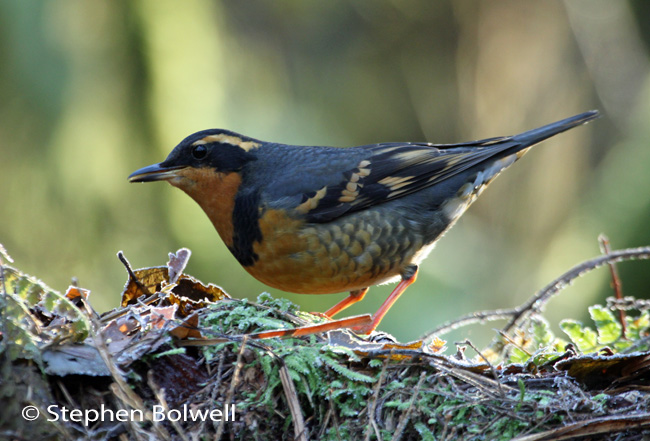
I’ve spent the best part of a day and a half, frozen to the bone, looking for thrushes, followed by an afternoon photographing them, and my success has been fleeting, but I’ve enjoyed being out there – any time with nature makes you feel more alive, even when you’re cold.
On this interesting afternoon all the ingredients were available for a perfect shot – the light was for a time quite beautiful and the birds were present. But in the end, fate conspired against me, although that’s an egocentric viewpoint that probably has no basis in reality.
In retrospect, this, the last day of 2015 has been the most surreal and interesting afternoon of the year for me, but when 2016 arrives… please… not another one quite like this.
N.B. Species diversity is the best measure of the health of our Planet and inevitably, that has consequences for us all. Human populations continue to expand in almost all inhabitable lowland areas of the world and nature reserves have an essential role to play in supporting wildlife, but increasingly, as our numbers increase, reserves are under pressure and it may be necessary to reconsider how much land we put aside to make the word ‘conserve’, meaningful. Presently, we do little more than congratulate ourselves for having reserves at all – in many cases these are multi-purpose and are sold to the public as amenity areas. In truth there are few politicians who have grasped the reality that sometimes you can’t conserve wildlife successfully in areas where people have other priorities – it only works if everybody understands what is required and behaves accordingly – a situation that politicians either can’t comprehend or simply don’t chose to. It would of course be different if birds had the vote – and in my parallel alternative surrealist world… they would.
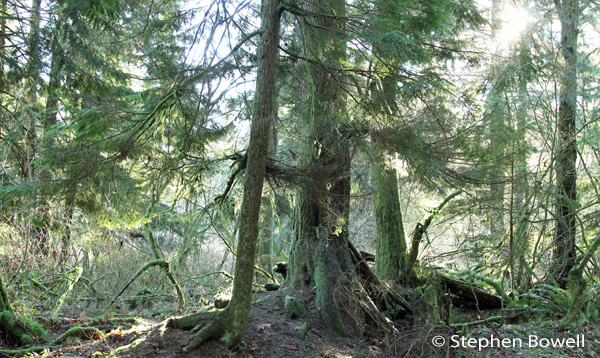
The truth is, we can do more or less whatever we like, providing we don’t reduce species diversity. In the end, whether a single species of bird continues to overwinter at a local reserve, wherever that might be, has far-reaching effects, because what happens radiates out in a three dimensional ball of environmental consequences. If wildlife is decreasing (and we know, broadly speaking, that it is) we must either provide more reserves, or limit our own longterm expansion. If we fail even common birds like the varied thrush, the results could be far reaching and make my surrealist nightmare of a day look like… Well… Just another walk in the park.
